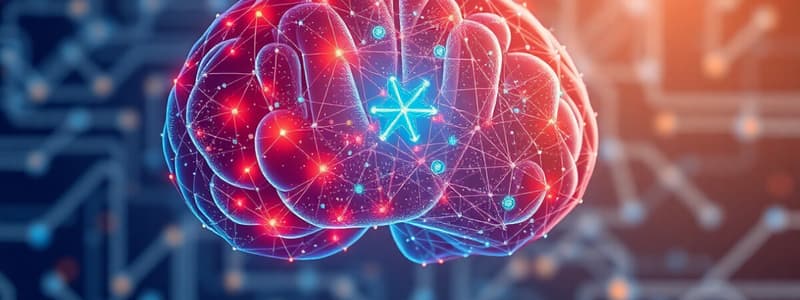Podcast
Questions and Answers
What is Artificial Intelligence?
What is Artificial Intelligence?
Artificial Intelligence (AI) is the field of computer science focused on creating systems that can perform tasks requiring human intelligence.
The Turing Test was proposed by ______ to measure a machine's ability to mimic human conversation.
The Turing Test was proposed by ______ to measure a machine's ability to mimic human conversation.
Alan Turing
What was the purpose of the Logic Theorist developed in 1955?
What was the purpose of the Logic Theorist developed in 1955?
It aimed to prove mathematical theorems in a way similar to human reasoning.
Which of the following is an example of an early natural language processing program?
Which of the following is an example of an early natural language processing program?
What was Deep Blue known for?
What was Deep Blue known for?
Which AI system won the 'Jeopardy!' quiz show in 2011?
Which AI system won the 'Jeopardy!' quiz show in 2011?
AI is primarily used in hospitality and tourism sectors.
AI is primarily used in hospitality and tourism sectors.
What is the purpose of Pyxis MedStation?
What is the purpose of Pyxis MedStation?
Which AI device automates the counting, packaging, and labeling of prescriptions?
Which AI device automates the counting, packaging, and labeling of prescriptions?
What are two applications that benefit pharmacy students?
What are two applications that benefit pharmacy students?
Flashcards are hidden until you start studying
Study Notes
Artificial Intelligence (AI)
- AI is a field of computer science focused on creating systems that can perform tasks requiring human intelligence.
- Tasks include: learning from experience, reasoning, problem-solving, understanding natural language, and perception.
- AI systems can be designed for specific tasks (recognizing images, translating languages) or more general problem solving.
Emergence of AI - Early Beginnings (1950s-1960s)
- Turing Test (1950): Proposed by Alan Turing to measure a machine's ability to mimic human conversation.
- Logic Theorist (1955): Developed by Allen Newell and Herbert A. Simon. It aimed to prove mathematical theorems in a human-like way.
- ELIZA (1966): One of the first natural language processing (NLP) programs, designed to simulate conversations with a therapist.
Emergence of AI - Expert Systems & Early Machine Learning (1970s-1980s)
- MYCIN (1972): An expert system developed at Stanford University to assist in bacterial infection diagnosis and antibiotic prescription.
- Early Machine Learning Systems (1980s): Basic machine learning techniques emerged, such as decision tree algorithms.
Emergence of AI - Periods of Decline and Modern Revival (1990s-2010s)
- Deep Blue (1997): A computer developed by IBM that defeated world chess champion Garry Kasparov.
- AIBO (1999): Sony's robotic dog, an early attempt to integrate AI into entertainment robots.
- Roomba Robots (2002): Automated vacuum cleaners using AI for autonomous navigation and cleaning.
- IBM Watson (2011): IBM's AI system won the "Jeopardy!" quiz show, showcasing AI's capabilities in natural language processing and information retrieval.
- Deep Learning and Neural Networks (2010s): The use of deep neural networks led to significant performance improvements in various applications.
Emergence of AI - Modern Applications (2020s - Present)
- Virtual Assistants (Siri, Alexa, Google Assistant): Use AI to understand voice commands and interact with users.
- GPT (Generative Language Models): Models like GPT-3 and GPT-4 generate human-like text.
- Self-Driving Cars (Tesla Vehicles): Utilize AI to process data from cameras and sensors for autonomous driving decisions.
- Advanced Medical Diagnostics: Deep learning algorithms are used in medical imaging to detect diseases like cancer.
- AI in Scientific Research: AI is used in drug discovery, new material identification, and biological data analysis.
Artificial Intelligence in Pharmacy
- AI is transforming various aspects of drug development, patient care, and operational efficiency.
- AI enhances the capabilities of pharmacists, improves patient care, and drives innovation in the pharmaceutical industry.
AI Applications for Pharmacy Students
- A variety of applications benefit pharmacists in their professional and academic fields, including:
- Epocrates
- UpToDate
- Figure 1
AI Devices
- Pyxis MedStation by BD: A secure, automated storage unit that manages medication dispensing in healthcare facilities.
- ScriptPro: Robotic systems that automate prescription counting, packaging, and labeling.
Studying That Suits You
Use AI to generate personalized quizzes and flashcards to suit your learning preferences.




